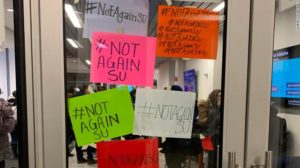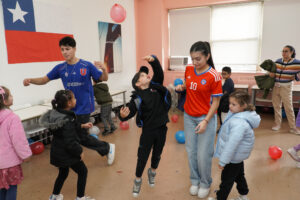Editor’s note: Sarah is a freshman at the S.I. Newhouse School of Public Communications at Syracuse University. She graduated from Briarcliff High School in 2019 and has been an intern for the River Journal since the beginning of the year. She wrote the following Op-Ed in late November.

As I write this in the comfort of my mom’s living room in Briarcliff Manor, 234 miles away from the Syracuse University Campus, it does not seem real that less than a day ago I was afraid to leave my residence hall due to multiple accounts of racism, antisemitism, and white supremacism reported across the university.
It is important to note that as a white student from Westchester, I cannot speak for the countless minority students who were personally victimized by these hate crimes. I was not verbally berated with deeply offensive language, nor was I terrorized with the alleged threat of ethnic cleansing by a white supremacy group. While I was afraid, I will never know the fear felt by those directly involved in the reported incidents.
That said, I belong to the Jewish community and chose Syracuse in part due to its reputation for having a strong Jewish population. I was not expecting to witness such blatant antisemitism. It was beyond shocking to receive news of a swastika drawn in the snow, which rippled a wave of panic throughout the campus. To make matters worse, a Jewish professor was anonymously sent an email telling her to go back to the ovens where the sender felt that members of the Jewish community belong, alluding to the Holocaust.
To be suddenly bombarded with emails from the Department of Public Safety recounting hate crimes on a nightly basis (sometimes more than one) was not only overwhelming but unacceptable. After the first couple of incidents, students were refreshing their emails in anticipation of another dreaded report. As hate crimes became a regular occurrence over the last few weeks, students were both frustrated with the administration’s lack of action and constantly anxious about their safety. To say that the campus environment had become both toxic and uneasy would be an understatement.
As the investigations progressed and federal law enforcement made its way onto our campus with the escalation in number and severity of incidents, attendance rates began to drop. Both students and professors started to feel unsafe coming to class, especially students specifically put at risk by the incidents directed toward minorities.
Classes were not officially cancelled by the university, and due to the fact that no one was physically harmed, the mental and emotional damage done by these heinous acts was not uniformly dealt with. While compassionate professors and other faculty members made a point of reaching out to their students and accommodating them with live streamed classes and pushed-back assignments, the absence of uniformity in these accommodations made it difficult for students to figure out what to do. As a result, students had to make their own decisions regarding their safety.
Some students, myself included, felt that it was necessary to leave campus due to the gravity of the situation. Many brave students stayed and protested, successfully evoking change within the administration by having the chancellor sign-off on the majority of their demands. For other students, the safety risk was too high and they felt obligated to remain in their dorm rooms as a safety precaution.
What was truly lacking from the administration was empathy. While student email inboxes were crowded with reported incidents and pages of safety protocols to be followed by the university, there was no true compassion expressed to let students know that the university was on their side. The university did not focus on the mental health of its frightened students and instead tried to function according to the academic schedule. Professors and students had to navigate the situation alone, working together to put student safety on the top of the list while the administration was busy saving face.
While the chancellor has agreed to improve student safety and make changes to address the harmful mindsets behind the incidents, students and faculty will never forget the pain caused throughout the past few weeks. As the end of the semester approaches, the Syracuse community must begin to heal and work to form an environment safe for a diverse student body.







Thank you for writing this, Sarah. You are a strong young woman and my heart goes out to you and to the entire SU community. Continue to stand up for what is right.